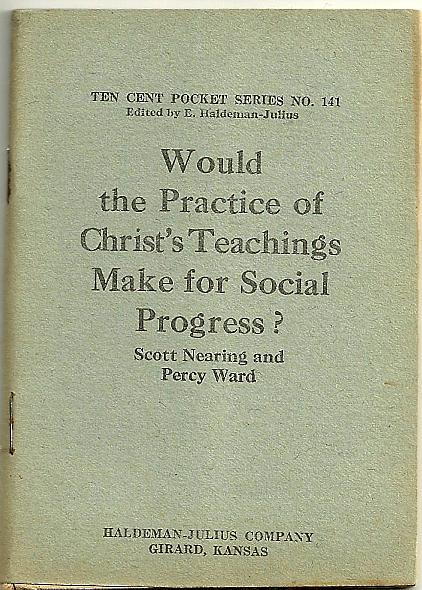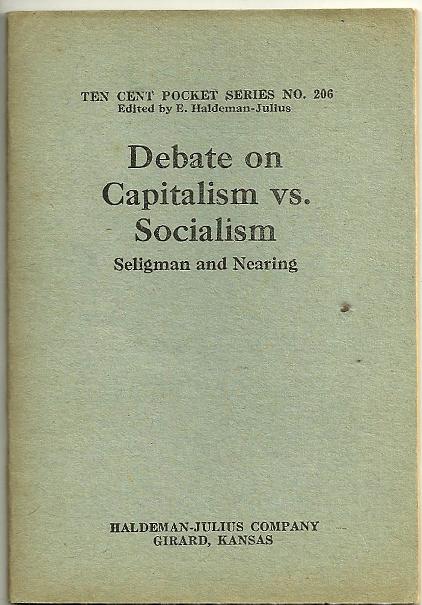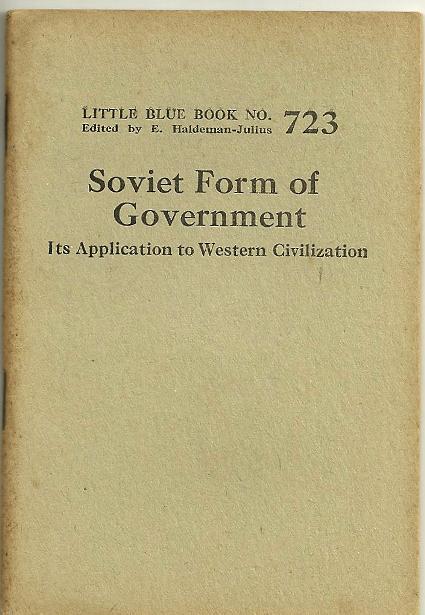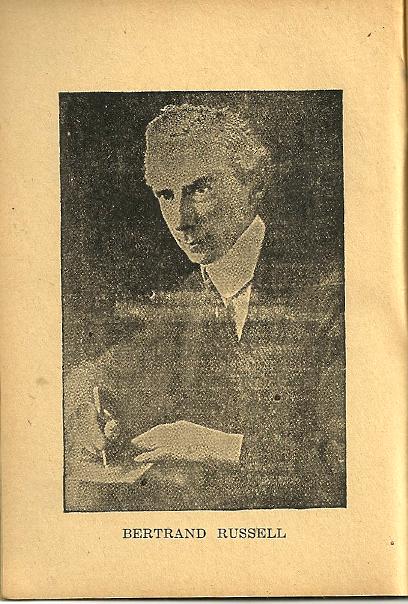Scott Nearing became an Honorary Founder of the Fortean Society, replacing Alexander Woollcott. Woollcott had left early in 1942, presumably because he liked Fort, but didn’t get along with Thayer. Thayer’s attacks on Roosevelt may have nettled him too, as he was an FDR fan. Nearing was a very different kind of character, a life-long advocate for socialism, pacifism, and vegetarianism. Later, he became a spokesman for homesteading and a return to the land, eventually living to 100.
Nearing contributed to three Little Blue Books, each a transcript of a debate.
Little Blue Book #141, “Would the Practice of Christ’s Teachings Make for Social Progress?”, pitted Nearing against Percy Ward, a socialist activist in Chicago. As one might predict, Nearing cherry-picks the more attractive parts of the Gospels, particularly the repudiation of wealth; and Ward selects the unpleasant bits, like the hatred of family and the importance of faith. Both are eloquent, but Ward’s “Progress depends not upon dead gods, but upon living men” got my vote.
The second debate, Little Blue Book #206, comes with a bit more background. It was held at the Lexington Theater, in New York City, on January 23, 1921. The subject was “Resolved, that Capitalism has more to offer to the workers of the United States than has Socialism,” with E. R. A. Seligman taking the affirmative, and Nearing the negative. Seligman was at the time head of the Department of Economics at Columbia University, and Nearing on the faculty of the Rand School of Social Sciences. To simplify somewhat, Seligman argues that socialism in Russia was not particularly successful; interestingly, he also argues for a sort of progressive capitalism modified by insurance for the poor and taxation of the rich. Nearing pleads for self-government in economic life, to combat the growing plutocracy. They don’t really differ that much, at least according to today’s more polarized politics.
Little Blue Book 723, “Soviet Form of Government: Its Application to Western Civilization,” sets Nearing against Bertrand Russell. It also bears the subtitle “A Debate on the Subject by Scott Nearing, Affirmative, and Bertrand Russell, Negative, with an Introduction of the Subject and Speakers by Samuel Untermeyer.” It’s worth reading in full; but Russell’s main argument is that the Soviet system was developed for a more primitive and rural society, and wouldn’t suit a more developed nation. He remains socialist, but prefers a transition to a system better fit for more industrialized economies, rather than revolution. Nearing retorts, “When the crisis does come, what will be the form of the transition society, if it isn’t the Soviet form?”
Incidentally, the booklet also contains photos and bios of Russell and Nearing. Here they both are, as of 1925. I apologize for the poor photos; Haldeman-Julius was known for shoddy printing.
(Posted by Doug Skinner)








2 responses so far ↓
1 Win // Oct 26, 2013 at 10:31 pm
Very interesting, Doug! My penny-worth of thoughts? Well,
Ward’s “Progress depends not upon dead gods, but upon living men” is a sentiment that was being expressed by some Roman philosophers right around the time that the Gospels were written, so it’s right on point.
Conerning the arguments in “Debate on Capitlism vs. Socialsm”, it’s perhaps little wonder that Seligman could claim that socialism in Russia was not particularly successful, considering that when he said so, in 1921, Russia was still in the throes of civil war, foreign intervention and a famine that killed 5 million. Five or ten years later, his assessment would certainly have less remarkable.
As to the debate on the Soviet Form of Government and Bertrand Russell’s contention that the Soviet system was developed for a primitive, rural society, I remember reading Das Kapital in my late teens and coming away with exactly the same thought: that Marx’s economic critique was pertinent mainly to a rural, agricultural economy of the mid-19th century. Engels, on the other hand, seemed to have a better grasp of the realities of urban industrial activity. The last example I can think of when a “crisis” resulted in a Soviet form of governance was Ghana in the early 1980s, when village councils were set up following Jerry Rawlings’ second coup: again, a “primitive, rural” society.
Oh well. Wonderful photo of Russell!
2 Doug // Oct 27, 2013 at 12:34 pm
All of the debates are lively, eloquent performances; my summaries don’t do them justice.
By the way, you can now use the word “socialism” is the comments. It was blocked by the spam filter before, since it contains the word “cialis,” a drug popular with spammers. Those filters are full of surprises.